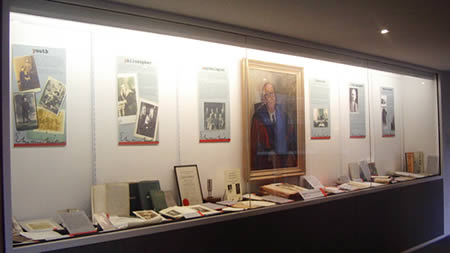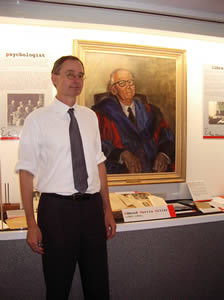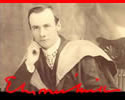Exhibition:
'Edmund Morris Miller 1881-1964: Philosopher, psychologist, librarian, bibliographer and administrator'
- an exhibition of materials from the University of Tasmania Special and Rare Materials Collection, the University Fine Arts collection and the School of Psychology' was launched by Professor Michael Roe and Dr Philip Mead on Monday May 7th 2007 and was on view between April and July 2007.

Speech by Philip Mead at the exhibition opening:
It was my brief to speak of Morris Miller as a bibliographer. Bibliographers are hardly the celebrities of the literary and book world. They tend to be viewed as drudges, obsessed with the material aspect of books and the history of publication. Either as librarians or as people spending their lives in libraries, they have neither the cultural celebrity of the author or the academic profile of the critic. Worse, they often seem to evince that strangest of pathologies, book fetishism!
And yet bibliographers are responsible for some of the most important infrastructure of our national culture. Together with those two industrial lawyers, Sir John Quick an Sir John Ferguson, Morris Miller was responsible for building the basic infrastructure of Australian literary studies and book history. Work like Morris Miller's Australian Literature from its Beginnings to 1935: a descriptive and bibliographical survey of books by Australian authors in poetry, drama, fiction, criticism and anthology with subsidiary to 1938 deserves to be recognised in the ABC TV docu-drama series 'Constructing Australia,' along with episodes about the overland telegraph and the Sydney Harbour Bridge. Like those great engineering feats, Morris Miller's bibliographical work, conducted heroically, over decades, provides one of the important foundations of our national institutions of knowledge.
The long association of Morris Miller with the University of Tasmania, and with bibliographical work in Australian literature is being continued today in the electronic era of national bibliography. The Literature of Tasmania dataset, a project of the AustLit consortium and The Bibliography of Australian Literature project (BAL), continues to develop and enhance the usefulness and relevance of Australian literary bibliography in the twenty-first century. This work also maintains the role of the University of Tasmania in contributing to this important aspect of national culture.
The poem 'In the Grounds of the Old University, Hobart,' by Vivian Smith, is from his New Selected Poems (Sydney: Angus & Robertson, 1995): 127-29. Smith was born in Hobart, attended the University of Tasmania as an undergraduate and also taught at UTas, before moving to the University of Sydney in 1967.
'In the Grounds of the Old University, Hobart.'
by Vivian Smith
Time takes all! How right the clichés prove!
This was once my university
and now administrative offices.
The laburnum, the monkey puzzle tree,
the European chestnut still remain
inside the garden where we sat and talked
and saw the stained colonial façade.
Across the road, the Domain where we walked.
No time now for young men’s irony;
a black hole has swallowed all we thought.
I wander through the grounds and look around,
thinking of teachers and the way they taught:
Louis Triebel on medieval French
and High German, “treasures of the past”,
and Jean Batt on “Language and the French
devotion to the things that last”;
and Morris Miller saying in the bus,
“I’m getting on, I’ve had another stroke,
this bit of my brain has quite gone,”
pointing with his finger as he spoke.
“The race is to the young: I’ve had my day…
Always take on tasks that others shirk”.
And then he laughed: “Mind isn’t merely brain
but without brains the whole thing cannot work.”
Here was the library (No bags allowed),
the rooms where lectures entertained or bored,
exams were passed, and different prizes won.
Impatience often proved its own reward.
Coffee in the café on the roof
watched over by the mountain and the hills!
I’ve kept one photo of us all these years.
We were such happy, smiling animals.
Mount Wellington has not yet been declared
one of the sacred mountains of the world.
It was my Athos and my Ararat,
my Fuji where a hundred views unfurled.
(If this had been Japan I might have tried
thirty ways of looking at its face
seeing it in its cliffs and rocks and trees
the meaning of the meaning of the place).
A mountain like a lion or a sphinx,
the way it changes colour through the day,
the walks I made, the slow climb to the top,
extinct volcanic site half blown away.
What coffee-house conspirators we were!
Aiming to change the world, what were we after?
Enthusiastic, idle, enterprising,
and young and arrogant and full of laughter.
Home is where you start from and return,
Not where you stay forever, so we said.
Later I came to think that home was words,
the language carried around in my head.
And here I walk beneath enduring trees,
the chestnut and laburnum still remain,
with nearly forty years already gone,
knowing twenty will not come again,
thinking of those who shared that world with me,
some famous now, and some already dead,
and Morris Miller pointing to his skull,
“Age brings diminishment”, he said.
“We cannot hold the past, so quickly gone;
unless to ask was this decreed or fated.
The past will only live so long in mind;
the past can only live if recreated.”
And now I stand between these darkened trees
as forty years ago, the branches lifting,
catching phrases first heard then,
the sweet disorder yes and time’s transshifting.
(from: Smith, Vivien, New Selected Poems
Sydney: Angus & Robertson, 1995)
|

Richard Dearden, Morris Miller Librarian, in front of portrait of Edmund Morris Miller by
Jack Carington Smith, Morris Miller Library exhibition 2007ACKNOWLEDGEMENTS:
Michael Roe, (School of History and Classics), for advice and captions on ‘the young E.M.M.’ and permission for exhibition notes to be made from his entry on Edmund Morris Miller in:
Australian Dictionary of Biography [electronic resource],[Canberra], Australian National University, 2006-
Philip Mead, (School of English, Journalism and Foreign Languages), for captions on Morris Miller’s contribution to Australian bibliography for advice, editing and loan of facsimile of 1st edition, Australian literature from its beginnings to 1935 : a descriptive and bibliographical survey of books by Australian authors...[Sydney], Sydney University Press, 1973.
Caroline Evans, (School of History and Classics), for advice and captions on ‘Mental Hygiene’ and the ‘Mental Deficiency Act of 1920’.
James Alexander, (School of Psychology), for loan of intelligence tests and tuning forks and accompanying captions.
Richard Dearden, (Morris Miller Librarian), for suggestion of Morris Miller exhibition and captions relating to Morris Miller’s contribution to libraries.
Rachael Rose, (University of Tasmania Fine Arts Collection), for loan of portrait of E. Morris Miller by Jack Carington Smith.
University of Queensland for posters on the history of Australian bibliography.
Emilia Ward for assistance with material from University of Tasmania Archives.
Exhibition curated by Gillian Ward and Zoe McKay with assistance from Heather Excell.
Graphic design by Gillian Ward.
|

